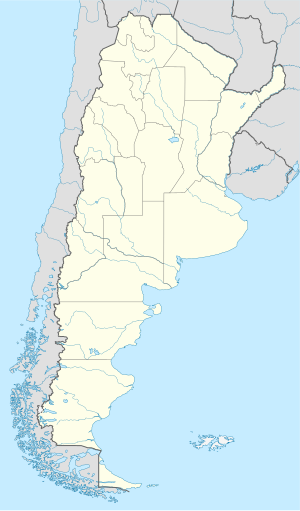Nuclear power in Argentina: Difference between revisions
No edit summary |
No edit summary |
||
| Line 1: | Line 1: | ||
{{Argentina nuke plant map}} |
{{Argentina nuke plant map}} |
||
In [[Argentina]], about 4% of the electricity comes from 3 operational [[nuclear reactor]]s: The [[Embalse Nuclear Power Station]], a |
In [[Argentina]], about 4% of the electricity comes from 3 operational [[nuclear reactor]]s: The [[Embalse Nuclear Power Station]], a [[CANDU reactor]], and the [[Atucha I Nuclear Power Plant|Atucha 1]] plant, a PHWR German design. In 2001, the plant was modified to burn Slightly Enriched Uranium, making it the first PHWR reactor to burn that fuel worldwide.{{Citation needed|date=July 2007}} Atucha originally was planned to be a complex with various reactors. [[Atucha II Nuclear Power Plant|Atucha 2]] (similar to Atucha1 but more powerful) began to produce energy on June 3, 2014, is expected to produce 745MWh. Plans for Atucha III, a third reactor in the Atucha complex, have been announced.<ref name=wnnargentina> |
||
{{cite news |
{{cite news |
||
| url=http://www.pagina12.com.ar/diario/elpais/1-177827-2011-09-29.html |
| url=http://www.pagina12.com.ar/diario/elpais/1-177827-2011-09-29.html |
||
Revision as of 21:21, 11 April 2015
In Argentina, about 4% of the electricity comes from 3 operational nuclear reactors: The Embalse Nuclear Power Station, a CANDU reactor, and the Atucha 1 plant, a PHWR German design. In 2001, the plant was modified to burn Slightly Enriched Uranium, making it the first PHWR reactor to burn that fuel worldwide.[citation needed] Atucha originally was planned to be a complex with various reactors. Atucha 2 (similar to Atucha1 but more powerful) began to produce energy on June 3, 2014, is expected to produce 745MWh. Plans for Atucha III, a third reactor in the Atucha complex, have been announced.[1]
Argentina also has some other research reactors, and exports nuclear technology. Nucleoeléctrica of Argentina and Atomic Energy of Canada Limited are negotiating over the contracts and project delivery model for a new 740 MWe Candu nuclear power plant.[2]
In July 2014, Russian President Vladimir Putin signed a nuclear energy cooperation agreement with Argentine President Cristina Fernández Kirchner, on a visit to the country.[3]
In February 2015, Argentine president Cristina Kirchner and Chinese president Xi Jinping signed a cooperation agreement, and the build of a Hualong One design power station has been proposed.[4][5]
Legislation
Provinces that ban build nuclear power plants:[6]
- Provincial Law, Nº 3902
- Article 1: Declare the territory of the Chaco Province nuclear-free zone.
- Provincial Law, Nº 4207
- Article 1: Prohibits throughout the territory of the Corrientes Province, installing nuclear plants.
- Provincial Law, Nº 8785
- Article 3: It is forbidden the installation of nuclear power plants
- Provincial Constitution
- Article 18: La Pampa is declared a nuclear-free zone, to the extent determined by a special law in order to preserve the environment. Any damage it causes to the environment will generate liability under the applicable legal regulations or as may be provided.[7]
- Provincial Law, Nº 5567
- Article 1: Declare the territory of the San Luis Province nuclear-free zone.
- Provincial Law, Nº 10753
- Article 1: It is forbidden in the Santa Fe Province, the installation of plants and/or temporary or permanent nuclear deposits.
- Article 3: Declare the Santa Fe Province nuclear-free zone.
- Provincial Constitution
- Article 56: It is forbidden in the Province. 1 - Conducting tests or nuclear tests of any kind for military purposes. 2 - Generation of energy from nuclear sources. 3 - Introduction and disposal of nuclear, chemical, biological waste or any other type or nature proven to be toxic, hazardous or potentially in the future.[8]
- Provincial Law, Nº 5253
- Article 47: It is forbidden in the province: b) Generate energy from nuclear sources.
References
- ^ "Una nueva central nuclear, 30 años después". 2011-09-29. Retrieved 2011-09-29.
- ^ "Canada, Argentina and China to cooperate on Candu projects". World Nuclear News. 2007-09-05. Retrieved 2010-06-20.
- ^ "Russia moves to support Argentina through new debt crisis". Argentina News.Net. Retrieved 13 July 2014.
{{cite news}}: Italic or bold markup not allowed in:|publisher=(help) - ^ "Hualong One selected for Argentina". World Nuclear News. 5 February 2015. Retrieved 9 March 2015.
- ^ Charlie Zhu and David Stanway (6 March 2015). "'Made in China' nuclear reactors a tough sell in global market". Reuters. Retrieved 9 March 2015.
- ^ Legislation map
- ^ La Pampa Constitution
- ^ Tierra del Fuego Constitution

